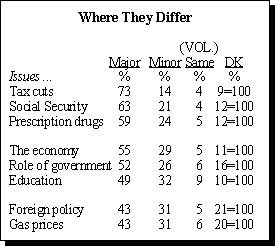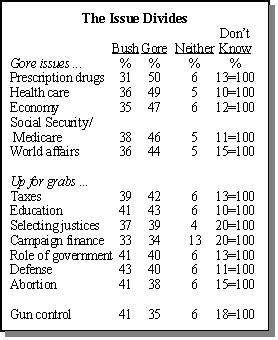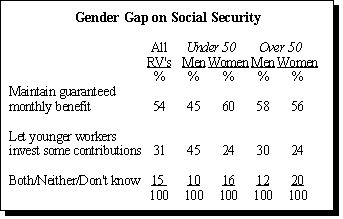The Veeps
 The vice presidential candidates are as evenly matched as their principals. When asked to choose between Lieberman and Cheney, voters divide evenly — 42% for the Democrat, 41% for the Republican. The gender gap in the presidential horse race is mirrored in this question about the bottom of the ticket. Men prefer Cheney by a 10-point margin, while women choose Lieberman by a similar margin. Independents, who are evenly split on their presidential preference, give Lieberman a slight edge over Cheney, 41%-35%.
The vice presidential candidates are as evenly matched as their principals. When asked to choose between Lieberman and Cheney, voters divide evenly — 42% for the Democrat, 41% for the Republican. The gender gap in the presidential horse race is mirrored in this question about the bottom of the ticket. Men prefer Cheney by a 10-point margin, while women choose Lieberman by a similar margin. Independents, who are evenly split on their presidential preference, give Lieberman a slight edge over Cheney, 41%-35%.
More See a Clear Choice
Voters increasingly see differences in the issue positions taken by Gore and Bush. By a two-to-one margin (61%-30%) voters say the candidates take different positions on the issues, up from 56% in September and 51% in June. Republicans, in particular, regard the campaign as a clear choice — seven-in-ten say there are differences on the issues, compared to 62% of Democrats and just half of independents.
 Fully 73% of voters find major differences between Gore and Bush on tax policy, and majorities say the candidates have significantly divergent positions on Social Security, prescription drugs, economic policies and proposals regarding the proper role of government in solving national problems.
Fully 73% of voters find major differences between Gore and Bush on tax policy, and majorities say the candidates have significantly divergent positions on Social Security, prescription drugs, economic policies and proposals regarding the proper role of government in solving national problems.
Yet while education is a dominant campaign issue, only 49% regard the differences between Gore and Bush in this area as major. Similarly, fewer voters see big differences in their approaches toward foreign policy and gas prices.
Big Issues to Gore
As in earlier polls, Gore continues to maintain a significant edge over Bush in voter assessments of who would do a better job in handling many key issues. The vice president holds a 50%-31% edge on being able to make prescription drugs more affordable for seniors. He also is seen as better able to keep Social Security and Medicare financially sound and to improve the health care system. In addition, Gore is seen as the candidate best able keep the economy strong, an issue that was closely contested earlier this fall. He now leads on that issue, 47%-35%.
 While more voters say Bush represents their views on gun control and abortion, his advantage on these issues is fairly small. Throughout the campaign, Bush has also held a slight edge in voters’ judgments about who would make the wiser decisions about the country’s defense policies, though his lead here is not statistically significant.
While more voters say Bush represents their views on gun control and abortion, his advantage on these issues is fairly small. Throughout the campaign, Bush has also held a slight edge in voters’ judgments about who would make the wiser decisions about the country’s defense policies, though his lead here is not statistically significant.
The electorate is more evenly divided over which candidate is better able to handle taxes, education, selecting justices to serve on the Supreme Court, campaign finance reform, and which man better reflects voters’ views about the role of government. The parity between Gore and Bush on tax and education policy is particularly significant, in part because they have emerged as major campaign themes, and because it represents a change from the summer. In June, Gore held a 44%-34% lead on education, while Bush was seen by more (41% to 34%) as better able to deal with taxes.
Gore Less Likable, More Qualified?
As in previous surveys, Bush holds the edge over Gore in personal qualities relating to leadership. More voters say Bush is the candidate willing to take a stand even if unpopular, and slightly more rate him as a strong leader, although his three-point lead over Gore (41%-38%) has been cut in half since September.
But Gore has his own personal strengths as well. He is widely seen as more qualified than Bush (by 49%-31%), and more voters view Gore as the candidate who cares about people like themselves. Gore also leads in being seen as the candidate who would use good judgment in a crisis. In June, equal numbers of voters saw Gore and Bush as qualified, and the Texas governor held a 44%-37% lead as the candidate with better judgment.
 Despite Gore’s edge in qualifications, recent events — including the first debate — appear to have taken a toll on voter perceptions of his honesty and his general likability. In September, 44% of voters said Gore was the more likable candidate, with 37% choosing Bush; today Bush holds a slight 41%-38% edge. Similarly, the number of voters who regard Gore as the more honest and truthful candidate has dropped somewhat from 37% in September to 32%, although Bush’s honesty ratings have not increased commensurately. Perhaps most worrisome for the vice president, his recent declines in likability and honesty have been sharper among some of his strongest supporters, particularly women.
Despite Gore’s edge in qualifications, recent events — including the first debate — appear to have taken a toll on voter perceptions of his honesty and his general likability. In September, 44% of voters said Gore was the more likable candidate, with 37% choosing Bush; today Bush holds a slight 41%-38% edge. Similarly, the number of voters who regard Gore as the more honest and truthful candidate has dropped somewhat from 37% in September to 32%, although Bush’s honesty ratings have not increased commensurately. Perhaps most worrisome for the vice president, his recent declines in likability and honesty have been sharper among some of his strongest supporters, particularly women.
Social Security: Status Quo Favored
Voters are of two minds about restructuring Social Security. Previous Pew Research Center surveys have shown strong support, in principle, for letting younger workers invest some payroll taxes in private accounts. But the current poll shows that support declines when the risks and rewards of market-based accounts are mentioned.
Overall, 54% of the electorate supports maintaining the current program; 31% would allow younger workers to decide for themselves how some of their contributions are invested, which could cause benefits to be higher or lower depending on how the investments perform. In the Pew survey in September, seven-in ten supported the general concept of private retirement accounts, but there was no mention that returns from those accounts could affect future benefits.
Not surprisingly, political partisans disagree over this issue. Half of Republicans (51%) support letting younger workers decide how some contributions are invested — even if that affects future benefits — while 32% want to maintain the status quo. Solid majorities of Democrats and independents favor keeping guaranteed benefits (72% and 59% respectively). Fully 61% who want to keep the system as is believe Gore would do a better job on Social Security; 63% of those who support permitting younger workers to make some investment decisions say the same about Bush.
There is a significant gender gap on this issue, but almost exclusively among younger people. Men under age 50 are evenly split — 45% would let younger workers decide for themselves how to invest some Social Security contributions, and 45% opt for guaranteed benefits. Women under age 50 favor guaranteed benefits by better than a two-to-one margin (60%-24%).
 Gender differences also emerge, with a more surprising result, in voter attitudes toward the FDA’s recent approval of the abortion pill RU-486. Overall, the electorate is split, with 43% approving of the FDA action, against 46% who disapprove. Men back the decision (49%-40%), while women, who traditionally are more supportive of abortion rights, oppose it (37%-52%).
Gender differences also emerge, with a more surprising result, in voter attitudes toward the FDA’s recent approval of the abortion pill RU-486. Overall, the electorate is split, with 43% approving of the FDA action, against 46% who disapprove. Men back the decision (49%-40%), while women, who traditionally are more supportive of abortion rights, oppose it (37%-52%).
Female college graduates tend to be much more supportive of the FDA ruling than other women. A majority of women college graduates (54%) support the RU-486 decision, compared to 39% who oppose the action. Women who have not graduated from college — a much larger group — come down solidly against the abortion pill (56%-31%).
A plurality of voters (47%) believe the United States should develop a missile defense system — a program that Bush has strongly supported. GOP voters back missile defense by nearly a three-to-one margin (62%-21%); Democrats are split (38% in favor, 40% opposed), as are independents (41%-45%).
Fully six-in-ten voters (61%) say the United States and its allies have a moral obligation to use military force to prevent genocide. More Democrats (67%) than Republicans (53%) hold this view.
The Kiss — Men Watched Too
 The passionate kiss by Al and Tipper Gore at the Democratic convention has resonated with voters more than other highly-publicized campaign events, including the appearances by both candidates on the Oprah Winfrey show.
The passionate kiss by Al and Tipper Gore at the Democratic convention has resonated with voters more than other highly-publicized campaign events, including the appearances by both candidates on the Oprah Winfrey show.
Fully 46% of voters say they heard “a lot” about the Gores’ kiss. Although some pundits have said the kiss “humanized” the vice president for women voters, as many men as women say they heard a great deal about the event.
In general, campaign events register more strongly with men than women. Indeed, more men say they heard a great deal about Gore’s support for tapping the Strategic Petroleum Reserve (52%) than heard of the Gores’ convention kiss, but just 34% of women heard a lot about the oil reserve issue.
Overall, six-in-ten voters say they have given a lot of thought to the presidential election, which is largely unchanged from September. That is only slightly less than the 65% who were paying a lot of attention to the campaign at this stage four years ago, but far less than the 77% who were fully engaged in the 1992 campaign.
But significantly more voters are paying very close attention to news about the campaign, at least compared to 1996. More than four-in-ten voters (42%) say they are following campaign news very closely; in November 1996, just 34% said they were following campaign news very closely. The number of people who report following campaign news very closely has jumped 15 percentage points since September.
Interest in the presidential debates has also increased since the Oct. 3 encounter between Gore and Bush. Nearly half of voters (49%) say it is now very likely they will watch the next two debates; before the first debate, 43% said it was very likely they would watch the debates — the same number as in 1996.
More than six-in-ten voters (63%) report watching at least a little of the first debate, while 37% tuned out entirely. A plurality of those who watched (41%) say Gore won the debate, compared to 32% who believe Bush prevailed. Democrats and Republicans overwhelmingly believe their party’s standard-bearer won, while independents say Gore won the debate 42%-25%.
Voters See Gore Victory
In spite of the closeness of the race, a plurality of voters (46%) now believe Gore will ultimately win the election. Roughly one-third think Bush will win, and 21% aren’t sure how it will turn out. At a comparable point in 1996, fully 79% of voters predicted Bill Clinton would win. Democrats are much more confident about Gore’s prospects than are Republicans about Bush’s. More than seven-in-ten Democrats think Gore will win the election, compared to 58% of Republicans who say Bush will prevail. On balance, independents say Gore will win — 47% vs. 32% who pick Bush. In June of this year, voters had a different view. Roughly half thought Bush would win in November, 33% chose Gore.


